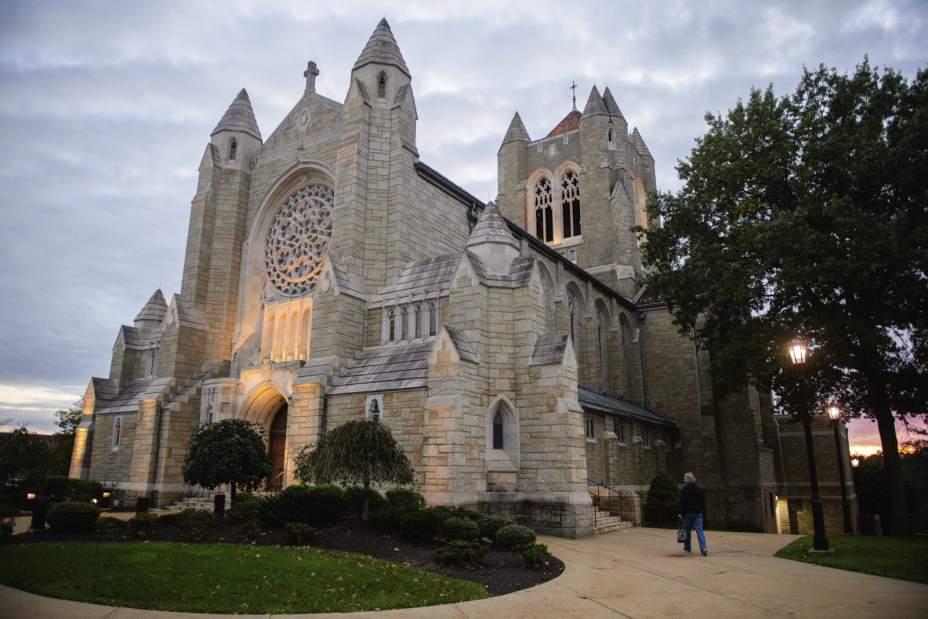|
Legal fees mount for Catholic dioceses amid sex abuse investigations
By Deb Erdley
Pennsylvania Catholic dioceses began to ante up legal fees in the wake of a statewide grand jury long before last summer, when the panel released its scathing report detailing allegations of rampant clergy sexual abuse and cover-ups. Recent financial reports in two dioceses — Greensburg and Erie — show those fees total about $5 million and counting. Church officials across the state concede legal costs are poised to grow as the U.S. Justice Department probes church records and Pennsylvania dioceses prepare to launch settlement funds for victims of past abuse. While most of the nation’s 177 Catholic dioceses and archdioceses post annual financial reports that detail some costs, many of those reports fall short of the level of transparency wanted by Voice of the Faithful, a Boston-based group that monitors the church’s diocesan reports. Some, such as the most recent financial report from the Scranton diocese, simply noted that the church had been served a subpoena for documents related to the Pennsylvania grand jury investigation. Margaret Roylance, of Voice of the Faithful, said the group was prompted to begin conducting transparency audits of financial reports of the nation’s dioceses in 2017 by concerns about where church funds are going in the wake of sexual abuse scandals and the establishment of settlement funds to compensate victims. Experts say settlements have cost the U.S. Catholic church $4 billion since 1950 and forced 14 dioceses across the country into bankruptcy. As recently as last year, the U.S. Conference of Catholic Bishops reported settlements and other costs associated with abuse claims totaled $212.9 million in 2017. Although it is unclear just how Pennsylvania dioceses will report settlement costs from the new compensation funds, church officials have said parish funds will not be tapped for payouts that will likely total tens of millions of dollars statewide. Rather, each diocese will look to their own assets, including insurance, investments and the possible sale of property. Even so, financial transparency will be important, Roylance said. Many diocesan assets ultimately were underwritten by assessments on parishes, she added. Parishioners in Greensburg and Erie can get a look at how legal fees are stacking up in recent financial reports released online. In its financial report posted this month, the Greensburg diocese reported spending $393,354 in legal fees in 2016-17 and $432,285 in the following fiscal year ending June 30, 2018. That’s about fourfold more than the average $84,000 the diocese, which claims about 137,640 congregants, paid in legal costs between 2013 and 2015. Sheila R. Murray, chief financial officer for the Greensburg diocese, noted that the church’s self-insurance fund covered the vast bulk of those costs. Legal costs in the Erie diocese, which claims about 220,000 congregants, were $2.9 million in 2017. The diocese has not posted its 2018 figures, though Bishop Lawrence Persico said legal fees related to the grand jury and an ongoing federal probe have exceeded $4 million to date. Officials with the Pittsburgh diocese, which represents about 632,000 congregants, did not respond to a request for information regarding legal fees related to the investigations. A diocesan financial report for the year ending June 30, 2017, listed legal costs as $448,772. Church officials say they have not paid to defend clergy accused of abuse. Legal costs began growing when investigators subpoenaed voluminous records going back decades and sought responses from diocesan officials. In Greensburg, those costs included legal fees from all former and current diocesan officials who were part of the grand jury process, including former Bishop Lawrence Brandt, diocese spokesman Jerry Zufelt said. The diocese went on record in support of the release of the grand jury report, even as Brandt challenged it and had his name blacked on on the interim release. In Erie, Persico said the legal costs included the diocese’s responses to the grand jury as well as an internal review conducted by its law firm. Persico was the first bishop to come out in support of the release of the grand jury’s findings. He drew the line at having the diocese pay for challenges to the report. Former Bishop Donald Trautman paid his own legal fees with regard to a challenge to the report that he later withdrew, a diocesan spokeswoman said. “There’s a track record of dioceses saying, ‘We’re going to settle these things, and it won’t come from the parishes.’ We’re not saying that isn’t true, but you have to look at these reports to know what’s going on,” Roylance said. “We’re trying to call them into account for what they’re doing.” They are not alone in their calls for more financial disclosure Catholics who attended a special listening session with Pittsburgh Bishop David Zubik on Thursday evening at St. Paul expressed those same sentiments, asking for a clear explanation of where their donations are going. In Pennsylvania, dioceses said they would not tap parish funds to underwrite settlement costs. While church officials say they’ve adopted strict guidelines for reporting abuse in recent years, Voice of the Faithful maintains many children would have been spared abuse had the church previously been open about claims and the settlements paid to victims. The group released its most recent annual report last week. The 2018 report used 10 questions to assess financial reporting standards. It then ranked dioceses on a 60-point scale based on answers to those questions. Of the 177 U.S. dioceses, 13 scored 56 points or higher; 11 scored 19 or lower. Roylance said her group found that the average score among Pennsylvania dioceses was 33.5 points — or six points below the 39.7 national average. Scores across the state ranged from a high of 55 points in Erie to a low of 19 in Harrisburg. Other scores included: Greensburg, 31; Pittsburgh 42; Philadelphia, 41; Scranton, 23; Allentown, 27; and Altoona-Johnstown, 31. Contact: derdley@tribweb.com
|
.
Any original material on these pages is copyright © BishopAccountability.org 2004. Reproduce freely with attribution.
